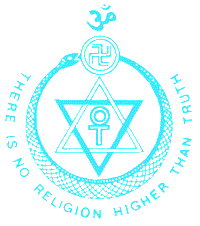KARMA

A Study in
Karma
by
Annie Besant
Published in
1917

Thought, The Builder
Now thought
works on matter; every change in consciousness is answered by a vibration in matter,
and a similar change, however often repeated, brings about a similar vibration.
This vibration is strongest in the matter nearest to you, and the matter
nearest to you is your own mental body. If you repeat a thought, it repeats the
corresponding vibration, and, as when matter has vibrated in a particular way
once it is easier for it to vibrate in that same way again than to vibrate in a
new way, the more often you repeat a thought the more ready the
vibrationary response. Presently, after much repetition, a
tendency will be set up in the matter of your mental body, automatically to
repeat the vibration on its own account; when it does this – since the
vibration in matter and the thought in consciousness are inseparably linked –
the thought appears in the mind without any previous activity on the part of
consciousness.
Hence when
you have thought over a thing – a virtue, an emotion, a wish – and have
deliberately come to the conclusion that it is a desirable thing to have that
virtue, to feel that emotion, to be moved by that wish, you quietly set to work
to create a habit of thought.
You think
deliberately of it every morning for a few minutes, and soon you find that it
arises spontaneously in the mind (by the aforesaid automatic activity of matter).
You persist in your thought-creation until you have formed a strong habit of
thought, a habit which can only be changed by an equally prolonged process of
thinking in the opposite direction. Even against the opposition of the will,
the thought recurs to the mind – as many have found when they are unable to
sleep in consequence of the involuntary recurrence of a harassing
thought. If you have thus established the habit, say, of
honesty, you will act honestly automatically; and if some strong gust of desire
sweeps you into dishonesty on some occasion, the honest habit will torment you
as it would never torment a habitual thief.
You have
created the habit of honesty; the thief has no such habit; hence you suffer
mentally when the habit is broken, and the thief suffers not at all.
Persistence in strengthening such a mental habit until it is stronger than any
force which can be brought to bear upon it makes the reliable man; he literally
cannot lie, cannot steal; he has built himself an impregnable
virtue.
By thought,
then, you can build any habit you choose to build. There is no virtue which you
cannot create by thought. The forces of nature work with you, for you
understand how to use them, and they become your servants.
If you love
your husband, your wife, your child, you find that this emotion of love causes
happiness in those who feel it. If you spread the love
outwards to others, an increase of happiness results. You, seeing this
and wishful for the happiness of all, deliberately begin to think love to
others, in an ever wider
and wider circle, until the love-attitude is your
normal attitude towards all you meet. You have created the love-habit, and have
generalized an emotion into a virtue, for a virtue is only a good emotion made
general and permanent (See Bhagavan Das’ The Science of Emotions)
Everything is under law; you cannot obtain mental ability or moral virtue by
sitting still and doing nothing.
You can
obtain both by strenuous and persevering thinking. You can build your mental
and moral nature by thinking, for "man is created by thought; what he
thinks upon, that he becomes; therefore think" on that which you aspire to
be, and inevitably it shall be yours. Thus shall you become a mental and moral
athlete, and your character shall grow rapidly; you made in the past the
character with which you were born; you are making now the character with which
you will die, and will return. This is karma. Every one is born with a
character, and the character is the most important part of karma. The Musalman says that "a man is born with his destiny
tied round his neck". For a man’s destiny depends chiefly on his
character.
A strong
character can overcome the most unfavourable
circumstances, and overclimb the most difficult
obstacles. A weak character is buffeted by circumstances, and fails before the
most trivial obstacles.
______________________
KARMA

Find out
more about
Theosophy
with these links

The Cardiff Theosophical Society Website
The National Wales Theosophy Website
If you
run a Theosophy Group, please feel free
to use any of the
material on this site
The Most Basic Theosophy
Website in the Universe
A quick overview of Theosophy
and the Theosophical Society
If you run a Theosophy Group you
can use this as an introductory handout.
Theosophy Cardiff’s Instant Guide
One liners and quick explanations
H P Blavatsky is
usually the only
Theosophist that
most people have ever
heard of. Let’s put
that right
The Voice of the Silence Website
An Independent Theosophical Republic
Links to Free Online Theosophy
Study Resources; Courses,
Writings,
The main criteria
for the inclusion of
links on this site is
that they have some
relationship (however
tenuous) to Theosophy
and are lightweight,
amusing or entertaining.
Topics include
Quantum Theory and Socks,
Dick Dastardly and Legendary Blues Singers.
A selection of
articles on Reincarnation
Provided in
response to the large
number of enquiries we
receive at
Cardiff
Theosophical Society on this subject
The Voice of the Silence Website
This is for everyone, you don’t have
to live
in Wales to make
good use of this Website
No
Aardvarks were harmed in the
The Spiritual Home of Urban Theosophy
The Earth Base for Evolutionary Theosophy
A B C D EFG H IJ KL M N OP QR S T UV WXYZ
Complete Theosophical Glossary in Plain Text Format
1.22MB
________________
Preface
Theosophy and the Masters General Principles
The Earth Chain Body and Astral Body Kama – Desire
Manas Of
Reincarnation Reincarnation Continued
Karma Kama Loka
Devachan
Cycles
Arguments Supporting Reincarnation
Differentiation Of Species Missing Links
Psychic Laws, Forces, and Phenomena
Psychic Phenomena and Spiritualism
Quick
Explanations with Links to More Detailed Info
What is Theosophy ? Theosophy Defined (More Detail)
Three Fundamental Propositions Key Concepts of Theosophy
Cosmogenesis
Anthropogenesis
Root Races
Karma
Ascended Masters After Death States
Reincarnation
The Seven Principles of Man Helena Petrovna Blavatsky
Colonel Henry Steel Olcott William Quan Judge
The Start of the Theosophical Society
History of the Theosophical Society
Theosophical Society Presidents
History of the Theosophical Society in Wales
The Three Objectives of the Theosophical Society
Explanation of the Theosophical Society Emblem
Glossaries of Theosophical Terms
An Outstanding
Introduction to Theosophy
By a student of
Katherine Tingley
Elementary Theosophy Who is the Man? Body and Soul
Body, Soul and Spirit Reincarnation Karma
Try
these if you are looking for a local
Theosophy
Group or Centre
UK Listing of Theosophical Groups